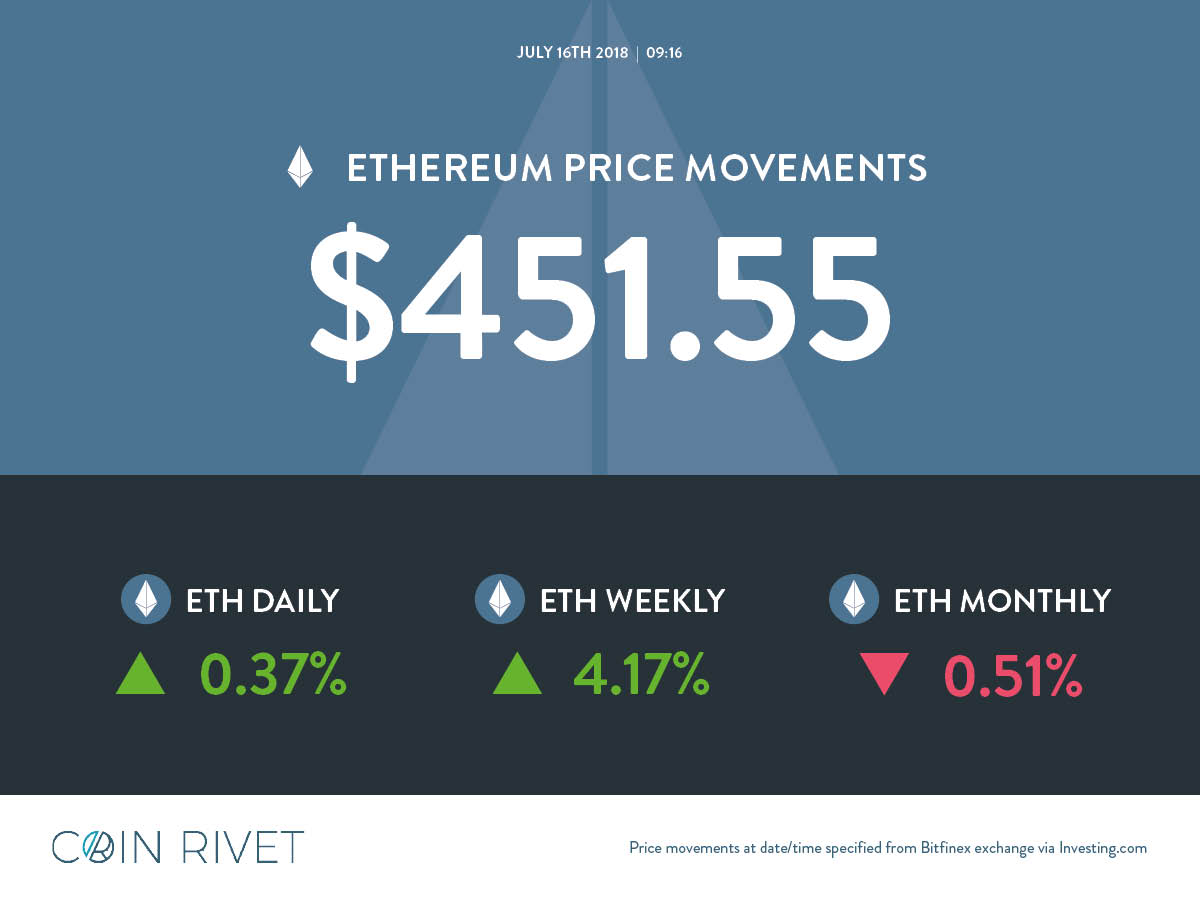

One of the founding principles of Coin Rivet is to promote understanding of cryptocurrencies and blockchain technology. Part of that understanding is looking at pricing trends for cryptocurrencies. This column is a regular analysis of the Ethereum price (ETH to USD). We compare against the US dollar for ease of comparison (all our cryptocurrency analysis will put values in the US dollar equivalent).
In discussing the prices of various cryptocurrencies, we are not recommending a coin neither are we recommending that you should invest in one. In fact, the more you learn and study the more you will realise that the price fluctuations of cryptocurrencies are volatile. As we all know the value of investments can go up as well as down. In the case of cryptocurrencies that can be a lot – in both directions.
Price: US$ 451.55
Daily: 0.37%
Weekly: 4.17%
Monthly: -0.51%
Ethereum was launched by Vitalik Buterin on 30th July 2015. He was a researcher and programmer working on Bitcoin Magazine and he initially wrote a white paper in 2013 describing Ethereum. Buterin had proposed that Bitcoin needed a scripting language. He decided to develop a new platform with a more general scripting language when he couldn’t get buy in to his proposal.
The development was funded by an online crowd sale between July and August 2014. The system went live with 11.9 million coins already mined for the crowd sale (about 13% of the total supply in circulation). Following the collapse of The DAO project in 2016, Ethereum was split into two blockchains. The new version became Ethereum and the original blockchain continues as Ethereum Classic.
Our regular article lists The Top 10 Cryptocurrencies.
If you would like to find out more about Ethereum and other Cryptocurrencies, then some of the information and links to other articles, news stories and guides on our site will be useful.
Cryptocurrencies are likely to become heavily regulated amid fears they are in a bubble and facilitating illegal activities, it has been suggested.
The comments by Andrew Cornell, Managing Editor of ANZ publication bluenotes, follow a report by the Bank for International Settlements (BIS) which referred to cryptocurrencies as a “combination of a bubble, a Ponzi scheme and an environmental disaster”.
Cornell writes in a blog that there has been a growing resistance to cryptocurrencies, which has contributed to speculators cashing out. The BIS, for example, warned they have a limited ability to satisfy the signature property of money, are unable to scale with transaction demand and fluctuate greatly in value.
The bank regulatory body said the emergence of cryptocurrencies calls for a globally coordinated approach to prevent abuses and strictly limit interconnections with regulated financial institutions. “In brief, like it or not, cryptocurrencies will be regulated, heavily,” Cornell writes.
Find out more by reading the full article.
Bob Loukas, the founder of Bitcoin.Live, has hit out at a recent report from the Bank for International Settlements (BIS) that called into question the stability and longevity of cryptocurrencies.
“With claims that Bitcoin is a poor substitute for the traditional institutional backing of money and that the technology comes with poor efficiency and vast energy use, you could say that the powerful banking group is looking backward and not forward. The report appears to be not only short sighted but also unware of the revolutionary changes that are happening right now,” he says.
Whilst the BIS report casts a large shadow within the UK, other countries are showing a more welcoming approach, Loukas argues. He flags up Dutch banking giant ING, which recently published new research showing the growth and acceptance of cryptocurrencies. Elsewhere, Facebook has reversed a high-profile ad ban and the Bahamas is set to offer a government-backed cryptocurrency pilot.
Find out more by reading the full article.
In late 2013, Vitalik Buterin was working on the Mastercoin project. Being an early Bitcoin enthusiast, he envisioned blockchain as more than just a payment system. In November 2013, Buterin wrote a whitepaper proposing Ethereum, and the idea garnered significant interest.
The concept began to become a reality and the Ethereum core team consisted of Mihai Alisie, Anthony Di Iorio, Charles Hoskinson along with Vitalik Buterin. Buterin presented at a Bitcoin conference held in Miami between 25th-26th January 2014. The participants gave him a standing applause and a lengthy Q&A session followed.
A presale was planned on 1st February 2014. However, this was dropped. A crowdfunding campaign went live from 20th July to 2nd September 2014. A total of 60 million Ether (the primary cryptocurrency of the Ethereum platform) were created to sell; this is also known as the Genesis issuance as these are the first ever Ether tokens created.
The price was 2,000 Ether (ETH) = one Bitcoin (BTC) for the first 14 days of the sale. The price then changed to 1,339 ETH per BTC for the remainder of the campaign.
The first two weeks of the campaign sold over 50 million tokens. 31.5k Bitcoins were raised through the crowd sale. Also, 12 million ETH were created which would be used as the funding for the development and other activities.
Find out more by reading the full article.
Ethereum is no longer the best cryptocurrency to mine, said Joshua Riddett, Founder and MD of UK-based Easy Crypto Hunter, during the MJAC Blockchain Summit, which took place in London this week.
He explained that to mine the top cryptocurrencies today such as Bitcoin and ETH requires very expensive hardware and users will “likely not make enough in return to absorb the cost”. However, he recommended those interested in getting involved to focus on other newer and lesser cryptocurrencies.
Find out more by reading the full article.
Denver, Colorado, 24th February 2025, Chainwire
Denver, Colorado, 20th February 2025, Chainwire
Washington, D.C., 18th February 2025, Chainwire
Dubai, UAE, 27th January 2025, Chainwire
Those who enter the market at this time may be surprised to hear that Bitcoin…
George Town, Grand Cayman, 22nd November 2024, Chainwire